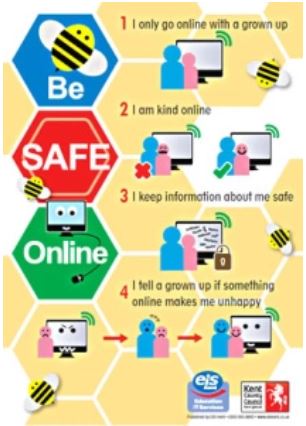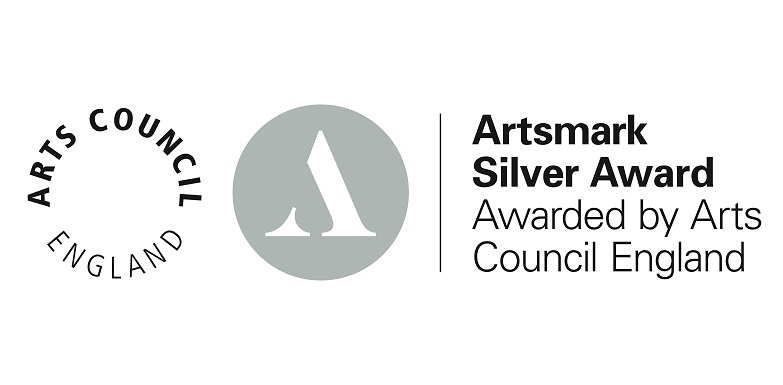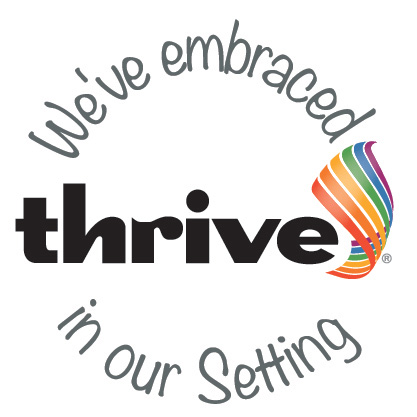Online Safety
KCSIE (Keeping Children Safe in Education) 2023 continues to strengthen the important message of online safety being recognised by all schools and colleges as a key safeguarding consideration and provides information and guidance to ensure DSLs and school/colleges leaders can take steps to protect their communities online.
Staff at Westbury Infant School adhere to the statutory guidance in the document, ‘Keeping Children Safe in Education’ which was updated in September 2023.
At Westbury Infant School, we learn about the importance of Online Safety.
 This is taught through discussion, drama, stories and other activities. Children are taught what to do if they experience something they don’t like online and where to seek advice both at home and in school.
This is taught through discussion, drama, stories and other activities. Children are taught what to do if they experience something they don’t like online and where to seek advice both at home and in school.
(Image courtesy of EiS Kent and Kent CC).
COVID Online Safety information
DfE Guidance for Online Safety During School Closures
The DfE have published new safeguarding guidance, including specific Online Safety guidelines, for schools and colleges to refer to during Covid-19 arrangements.
The Online Safety section can be found at:
https://www.gov.uk/government/publications/covid-19-safeguarding-in-schools-colleges-and-other-providers/coronavirus-covid-19-safeguarding-in-schools-colleges-and-other-providers#online-safety-in-schools-and-colleges
Top Tips for Home Learning and Online Safety guides
Click on these links for more information:
- 11 Point Safety Guide to Video Chat
- What Parents Need to Know about Zoom
- What Parents Need to Know about House Party
- Top Tips for Remote Learning for Parents
- Top tips for remote learning for Pupils
- Top Tips For Remote Learning for Teachers
- What Parents Need to Know About Screen Addiction
Support for parents and carers during schools closures
During school closures, it will be particularly helpful for families to have access to guidance and support to keep each other healthy and safe with technology. These suggestions could be shared via your school website or social media:
- ‘Common Sense’ support for parents: https://www.commonsensemedia.org/aboutus/news/press-releases/common-sense-provides-resources-for-parents-to-prepare-forcoronavirus
- NSPCC/O2 helpline 0808 800 5002 9am - 7pm
- Ask about Games and Common Sense Media list of appropriate games
- Change for Life Activities: https://www.nhs.uk/change4life/activities
- www.internetmatters.org (including advice by age group)
- www.childnet.com/parents-and-carers (including advice on Parent controls)
- www.saferinternet.org.uk/advice-centre (including safety tools on social networks)
- https://swgfl.org.uk/resources/checklists (including Roblox and TikTok)
- https://www.nspcc.org.uk/globalassets/documents/advice-and-info/share-aware.pdf (including talking points, getting the family involved and ‘safety starts with you’
- Thinkuknow website(Including guidance and support with keeping children safe online)
- How to set up a video call (BBC News): https://www.bbc.co.uk/news/technology-51968122
Childline's Calm Zone
Many children and adults have times when they find it tricky to stay calm. Childline have launched a new area of their website to help. Their Calm Zone includes:
|
|
and is free to use.at:
https://www.childline.org.uk/toolbox/calm-zone/
Online Safety at Home Resources
The education team at Thinkuknow have launched new #OnlineSafetyAtHome resources to support schools and families during Covid-19 closures. The packs, which are released every fortnight, include 15 minute activities parents and carers can do with their child to support their online safety at home and are all for all age groups.
Thinkuknow have also published social media support resources to help schools share Online Safety resources with their families.
https://www.thinkuknow.co.uk/professionals/our-views/onlinesafetyathome-resources
DigiSafe Undressed Campaign
The 'Undressed' campaign from Digisafe is designed to give the youngest primary age children age-appropriate messages about not getting changed or undressed online. Research shows that young children can be tricked or coerced through games and challenges to remove their clothes in front of a camera, which is why it is essential that this message is communicated even at this early age.
Digisafe have released a new animation and other resources to support their already existing materials. Find the new resources and more information about why this campaign is so important at: https://undressed.lgfl.net/
Parental Controls Booklet
parental controls booklet 2021.pdf
The Internet is an essential element of 21st century life for education, business and social interaction, and we have a duty to provide our children with quality Internet access as part of their learning experience.
We believe that teaching our children how to stay safe when using the Internet is an extremely important part of this experience.
In school children are taught about Online Safety as part of the Computing Curriculum. In FS and KS1 children are taught about protecting personal details and how to use the internet responsibly
Below is a website that you may find useful if you need to seek support or advice.
https://www.saferinternet.org.uk/training-events/online-safety-live
Each term we hope to send an Online Safety newsletter to parents/carers.
If you are worried about something that has happened while you or your children have been online and need help, children - talk to your parents first, then click on the button below and you can share your concerns safely with CEOP - The Internet Police.
If you would like to find out more about keeping your child/ren safe, see our newsletters below for more information.
Termly Online Safety Newsletters: Academic Year 2023-24
Termly Online Safety Newsletters: Academic Year 2022-23
Academic Year 2022/2023
- Online Safety newsletter Term 6 2023
- Online Safety newsletter Term 2 2022
- Online Safety newsletter Term 5 2023
- Online Safety newsletter Term 4 2023
- Online Safety newsletter Term 1 2022
- Online Safety newsletter Term 3 2023
Termly Online Safety Newsletters: Academic Year 2021-22
Academic Year 2021/2022
- Online Safety newsletter Term 6 2022 1
- Online Safety newsletter Term 4 2022
- Online Safety newsletter Term 3 2022
- Online Safety newsletter Term 5 2022
- Online Safety Newsletter Term 2 2021
- Online Safety newsletter Term 1 2021 1
Termly Online Safety Newsletters: Academic Year 2020-21
Academic Year 2021/2022
Academic Year 2020/2021
- NEW WIS Covid Online Safety newsletter March 2021
- NEW WIS Covid Online Safety newsletter January 2021
Academic Year 2019/2020
- NEW WIS Covid Online Safety newsletter JuneJuly2020
- NEW WIS Covid Online Safety newsletter May2020
- NEW WIS Online Safety newsletter February 2020
Safer Internet Day
Safer Internet Day is celebrated globally in February each year to promote the safe and positive use of digital technology for children and young people and inspire a national conversation.
Coordinated in the UK by the UK Safer Internet Centre the celebration sees hundreds of organisations get involved to help promote the safe, responsible and positive use of digital technology for children and young people. Globally, Safer Internet Day is celebrated in over a hundred countries, coordinated by the joint Insafe/INHOPE network, with the support of the European Commission, and national Safer Internet Centres across Europe. The day offers the opportunity to highlight positive uses of technology and to explore the role we all play in helping to create a better and safer online community. Coordinated in the UK by the UK Safer Internet Centre the celebration sees hundreds of organisations unite to raise awareness of online safety issues and run events and activities right across the UK.
The next Safer Internet Day is on Tuesday 14th February 2023.
Websites used in school:
Foundation/KS1
DigiDuck App - you can download this app for Apple here or Android here.
Online Safety Policy
We have an IT/Online safety policy with is agreed by staff and governors. You can access the policy here.
As part of our admissions process, parents are asked to sign our ‘Acceptable Use Policy’ , this form is also included as part of the prospectus.
Useful websites
https://www.vpnmentor.com/blog/the-ultimate-parent-guide-for-child-internet/
Safe search engine for children
Vodafone Digital Parenting – resources on setting up electronic devices and using the internet
http://vodafonedigitalparenting.co.uk/
http://www.vodafone.com/content/parents.html
The National Society for the Prevention of Cruelty to Children (NSPCC) is a charity campaigning and working in child protection
ConnectSafely.org is an organization dedicated to educating users of connected technology about safety, privacy and security.
http://www.connectsafely.org/about-us/
BBC Web wise
http://www.bbc.co.uk/webwise/a-z/
Free advice on being safe online
https://www.getsafeonline.org/
Internet Matters is a not-for-profit organisation working with online safety experts to bring you all the information you need to keep your children safe online.
http://www.internetmatters.org/
Childnet’s mission is to work in partnership with others around the world to help make the internet a great and safe place for children.
http://www.internetmatters.org/
Common Sense is dedicated to helping kids thrive in a world of media and technology.
https://www.commonsensemedia.org/
Setting up filters
http://www.saferinternet.org.uk/advice-and-resources/parents-and-carers/parental-controls
Parents' Guide
https://pixelprivacy.com/resources/keep-children-safe-online/




